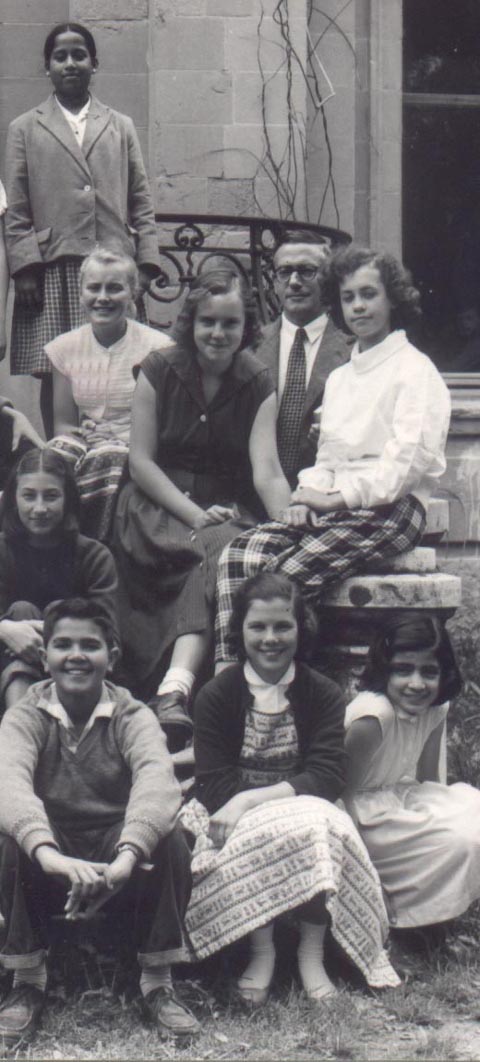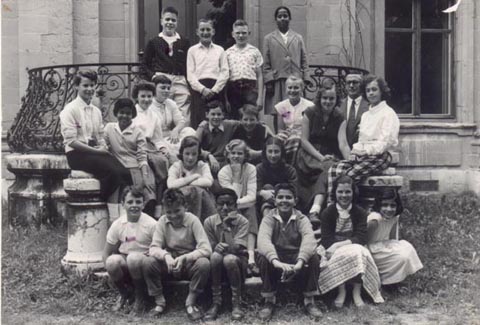Michael Quin

I was deeply saddened to hear of Mr. Quin's death. I was at Ecolint for my graduating year in 1968 and remember feeling fortunate that a philosophy course was being taught. No such offering was available at my high school in the States at that time. To this day, Mr. Quin's recounting of the death of Socrates is vividly etched in my mind, as his account made it feel so immediate. When Socrates swallowed the poison, there was not a sound in the classroom. You were there! Due to such a favorable introduction to Socratic philosophy I went on to study logic at the university level and actually met my husband at one of these courses!
... Edith Seigel
My Latin O-level classes with him in the mid and end sixties were extremely special - magical, I would say retrospectively. I was one of the IB guinea pigs for Latin, and although I could not continue with Latin A levels because I was the only candidate, I picked it up at university and ended with a Latin major, as well as one year of Greek. Up to today, those ancient languages hold an incredible fascination for me, and Mr. Quin will always, I am sure, be part of this magical world.
I would like to convey my sympathy to his family.
Vale, Magister!
... Marita Smit
Tribute to Mr Quin.
I would like to say that Mr Quin was one of the teachers -- he taught me Latin -- that I remember best and most favourably from my schooldays anywhere. I recall his pipe, his measured step and speech, and his reminiscences of India and of the army.
I am glad to hear he has lived a long life. Rest in Peace.
... Peter Zohrab
I took Philosophy from Mr. Quin in 1966-67, and I still treasure the experience of his dramatic classroom presentation of Plato's Cave Allegory. He was absolutely everything a teacher should be... intelligent, well-read, gracious, engaging. We were so lucky to know him!
... Gretchen Muehl, '67
In 1999 at the World Reunion, I went up to Mr. Quin after the dinner at La Grande Boissiere the first night and stood in line with his former students. He was very nattily dressed--I seem to recall a brilliant white shirt or a brilliant white collar and a handkerchief in the jacket pocket that went with the tie. He was paying attention to each person as if there no others. It was already quite dark when my turn came and I think I was last. I said I was a former student, but didn't tell him my name, not thinking it would mean anything to him. I told him how my Latin had helped me with my other languages, including Russian. He was extremely pleased and asked what I was doing as a profession. I described it briefly and he said in his wonderful slow and sonorous voice that took me back to knee socks, "You are doing very important work." We chatted for a few more minutes and I gave him my card as a souvenir. It had my name, Peggy, on it, but it was too dark and and the type too small for him to really see it. As I shook his hand good-bye, he said, "I've enjoyed talking with you, Margaret." I was in shock. That was my school name--no-one calls me that anymore. Mr. Quin had had reached back in his memory of hundreds of students over decades and found the little girl with a similar face to mine who had struggled with Latin in his class. Amazing. I felt connected to my past in a way that nothing else accomplished for me. For that moment alone it was worth going to the reunion and I imagine it is for such experiences that we return.
I had Mr. Quin for Latin around 1954. It was slow work, but there were glimmers. One such was when he gave us Horace to read. One day he read it to us aloud with great emphasis on the sounds. I remember hearing the sound "o" repeated over and over. I didn't understand the poem, but this mournful cry arrested me. I looked at him closely. He was doing this deliberately, trying to bring the poem to life for us--and I had a revelation--this was a real language with feelings, written by real people. But more typically, we tried to write Latin sentences with our scratchy pens, glancing longingly at the beautiful trees and grass outside the classroom. When Mr. Quin would correct my work, I remember thinking, "how could anyone know this as a language, and actually catch mistakes? I'll never learn it, nothing is sticking..." Well, I was wrong. Last Friday I was at a concert of Mozart's Requiem, reading along in Latin with the chorus and, lo and behold, I caught a mistake, a Latin typo! about forty-five years after Mr. Quin's patient labor. It gave me a little thrill to think that I still remembered, but it is really a tribute to outstanding, devoted teaching. Thank you, Mr. Quin.
... Peggy Troupin Class of 1960
Dear Anciens who knew Mr. Quin! I loved and repected him, as, I am sure did every single one of his pupils. Many teachers have been forgotten by us as we are all getting a bit older, but not so Mr. Quin. And he had a fabulous memory himself. As I attended one of the Anciens Days ten or so years back, I was wandering around the grounds of my beloved Grande Boissiere and reliving some of the memories as, on the topmost steps of the Greek Theater I run into Mr. Quin standing with Madame Briquet. Can you imagine that they both broke into a great big smile and actually said " Well, well, if it isn't Mary!" Now, can anyone try to count the number of pupils that had gone through their classes since 1957 when I left Ecolint!? And then they remember one single one out of all the others, after so many years! Weren't we lucky to have such teachers? So sorry he had to go.
... Love to all Marie-Helene Bachofen-Echt
What a great loss. He signed all our returned assignments "T.M. Quin," and he told our class his name was Thomas Michael Quin. The photo is from the 1956-1957 school year, and it was the Form 1 class. I am in the top row, first on the left. I could name you almost everyone in the picture.
I was so glad to see him at the reunion in 1999, where he seemed as happy as anyone could be, surrounded by deeply appreciative former students, remembering his years teaching us, showing us more unabashedly than he could have done in the role of teacher, how much he loved us and how much he loved teaching. He was walking around on a fractured hip, which he took in stride, as he seemed to take everything that came his way in stride, obviously regarding it a privilege to be alive. I am glad that I was able to tell him then that he was likely the best teacher I'd had in my life. Back in 1956-57 I took German instead of Latin, so I never had that subject with him. But that year our Form 1 class had both English and Social Studies with him.
Exceptionally erudite and distinguished, he injected so much of himself into his teaching, his experience in the British army in WW II in India, I believe -- like the time he was stung by a scorpion in his bath; his childhood experiences, like the time he saw a silver fox out of his window, and being Irish, believing this was an omen; or his memory of being administered "corporal punishment" as a child by his headmaster, which involved having one's hands beaten with a ruler. He described how one would wait outside the headmaster's office for one's punishment, warming one's hands on the radiator because doing so would reduce the pain. He compared that time with our own time, which he viewed as more enlightened. Something once prompted him to speculate on what is the "best" society, saying it was probably not the U.S.A., as his American students had been raised to believe, but rather more likely the Scandinavian countries, with the social democracy they were able to offer their citizens. He read us the account of the Crusades by Joinville -- social studies united history and geography -- translating from French as he went along. Among our social studies lessons, he taught us how to give someone directions to a given location -- how to state landmarks and turns clearly. I'm still using that lesson when I'm asked directions. He asked us to draw a map of Geneva. His comment on mine was "this looks more like Picasso than a map." Thus I learned who Picasso was. In addition to loving us and loving teaching, he exuded a love for his subject matter -- the richness of the physical world, the majestic sweep of history, the privilege of living in 20th century civilization.
His romance with the comely Miss Hawkridge, later to become Mrs. Quin, was conducted with the heart dignity and discretion. Imagine such a gentleman buying an MG, probably in 1959, and announcing to his students that he would never drive it over 30 mph. He was always impeccable in a gray flannel double-breasted suit, and smoked a cheroot each day at break time, not displeased to explain to us the difference between a cheroot and a cigar.
What a privilege to have been taught by the likes of Mr. Quin.
... Best, Steve Tobias '55-'59
Mr Quin was a wise, and learned, and civilised man, with an understated sense of humour and a twinkle in his eye (he didn't miss a thing). I fear they do not make them like that any more.
... Robin Dormer LGB '69
Mr. Quinn was one of the grand old gentlemen. There were few like him even in 1967. Alas the world is a sadder place with his passing.
... Stuart Ballin
I sincerely appreciated him. From our conversation I know he had a very interestin and full life. I remember he told us once that during the WWII he had been in chare of a prison in India. In our Latin class group we used to call him, with much respect and I may dare say love, the 'old fox'.
... Regards Pablo Canziani

Return to Tributes to Ecolint Teachers
2006-01-26 by: Ecolint Online